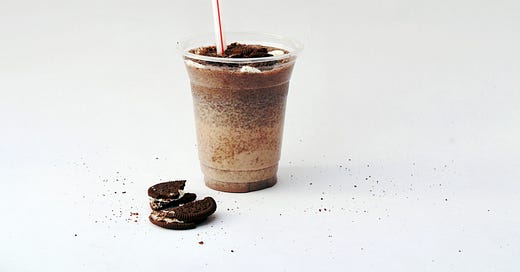
We took our daughter Rory fishing the other day for her birthday. She turned 7 and is quite a nature enthusiast. There’s a stocked pond that’s close to us full of trout where you pay by the catch. She caught two big ones yesterday — a 16" and an 18" (with a little help from her parents who have never in their recollection caught a fish before).
Since her grandma (my mother-in-law) runs a restaurant here in town, we took the fish over so she could grill them up for us for dinner (the pond people clean the fish and put them on ice for you — yes, this is the ‘glamping’ version of fishing).
When grandma was doing a re-cleaning and beheading of the fish, Rory was watching intensely. When grandma’s knife severed the throat, Rory grabbed the head of the fish. She held it firmly. Then she started poking the eyeball. Not in a silly way, but in a serious, reflective way. A forlorn expression washed over her face.
It had hit her that she’d truly taken the fish’s life. Even though Alex and I talked with her about it beforehand(at length, due to her 6-year-old inquiring mind) and made sure that she was ‘okay’ doing this, she was affected by it. It was personal.
We talked about how living things have been eating other living things since the beginning of existence. We talked about how, though the fish dies a real death, when we eat them, the fish lives on in us (I’m trying here, okay!).
As we discussed it, I realized how sacred eating living things is. And she did too. But back to the restaurant beheading scene…
So, Rory was having a moment. She didn’t want to let the fish head go into the uncaring depths of the trash can. But it wasn’t dinner time yet and we had to go walk the dog and do some things before. As far as we knew, when we left, grandma threw the heads into the waste bin. Rory was a bit dreary when we left but she slowly started to perk up again.
When we went back to the restaurant to eat our catch, she was fine. The fish, prepped by grandma and filleted out for us to eat, looked amazing. And it tasted even better.
I’ve never eaten anything that I’d seen living earlier that day. As fresh as it gets. It tasted like it still had life in it. I could tell Rory was enjoying hers too.
There’s something about looking into the eyes —beholding the face and head — of something you’ve killed. You’re not just eating impersonal material to fill your belly with. You’re eating a persona. Something that once looked through two eyes, tasted through a mouth, and felt the cool water drift across its flesh just like you do.
That night, before bed, we said a prayer for the fish. We named our sorrow that the fish had to die. And we thanked God that the fish was able to live on in us.
This whole process, from the deep discussions leading up to the catch to the catch itself and then the cleaning, prepping, and further discussions about the circle of life and our roles in it made me realize how out of touch we’ve become with the things we consume.
And not just with food.
Everything.
My ancestors, in their castles and shacks (probably more like the latter) didn’t just click to order their furniture at a deep discount from an anonymous outfit behind a glass screen in a cheap transaction. They likely had an intimate connection with the whole process…
They played in the forest as kids that the trees were sourced from. They knew the people and the families of the people who harvested and shaped the wood into functionally beautiful sofas and chairs. When they hunted and fished, they looked into the eyes of the beasts they preyed on.
Their blessings around the dinner table meant something. Ours today… Don’t.
Not really.
I mean, who says table blessings today besides on the holidays? And when we do thank God for our meal, how can we really mean it when we picked the turkey up from WalMart at a couple of bucks a pound? My family doesn’t even say grace regularly and I’m in seminary.
In some ways, I guess you could say, we’ve benefitted from our consumer-focused world. Things are cheaper, easier, and faster to get. Where they come from and how they get to us is — at most — an afterthought. No emotional labor is necessary to attain and consume most everything.
No wonder we take so much for granted today. No wonder that gratitude and reverence often have to be force-fed to us through phone apps and books rather than through the natural rhythms of life in the things we kill, chop down, harvest, eat, and use to live. Which makes me wonder…
Have we benefitted, really?




